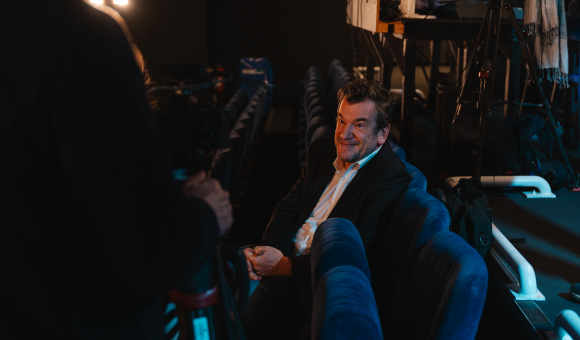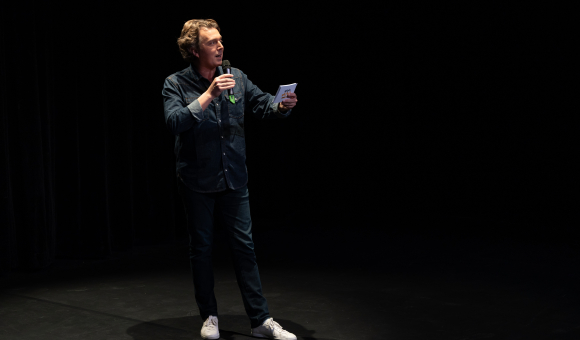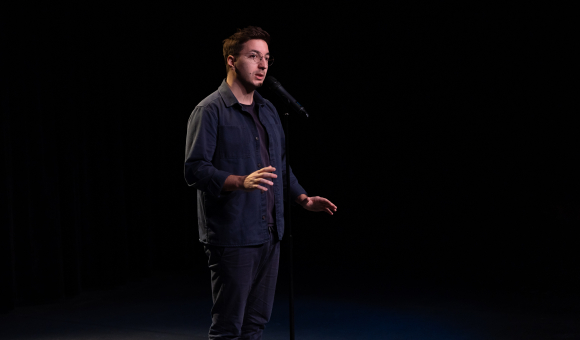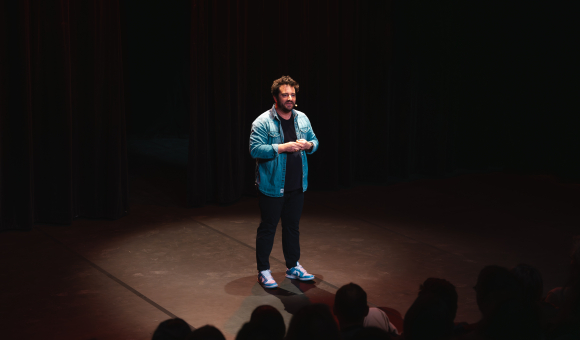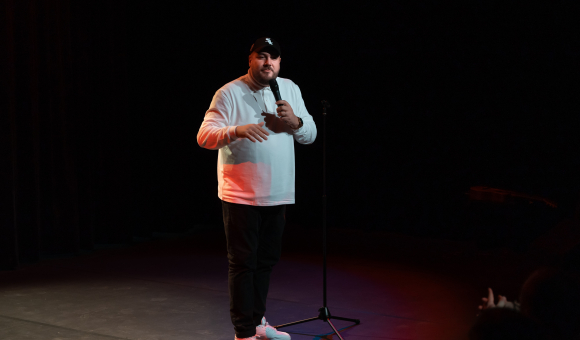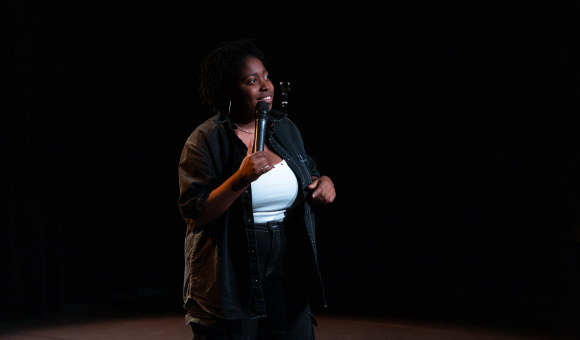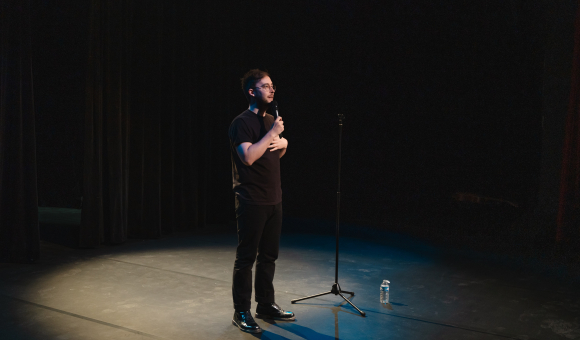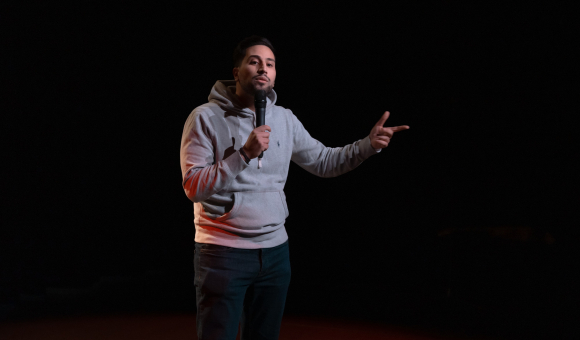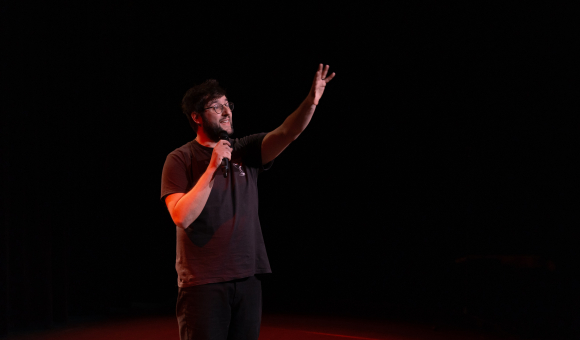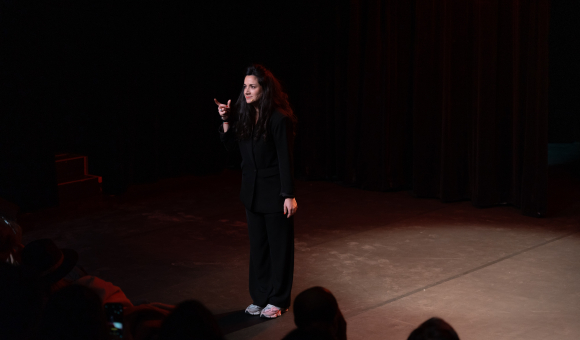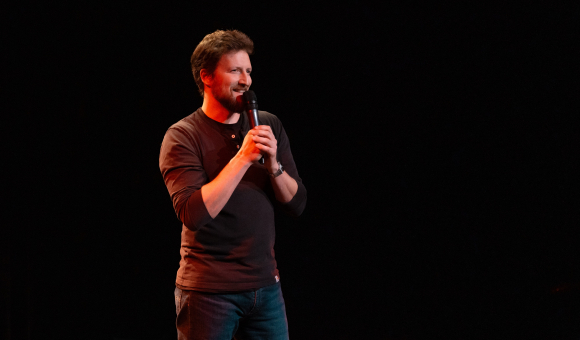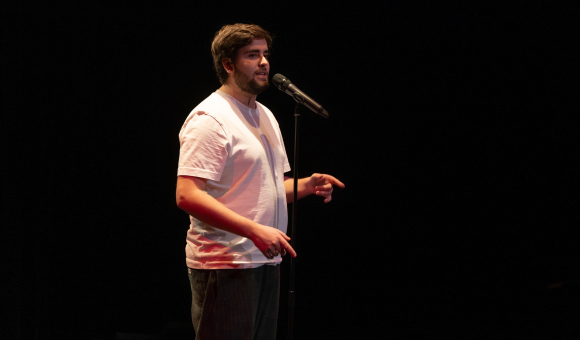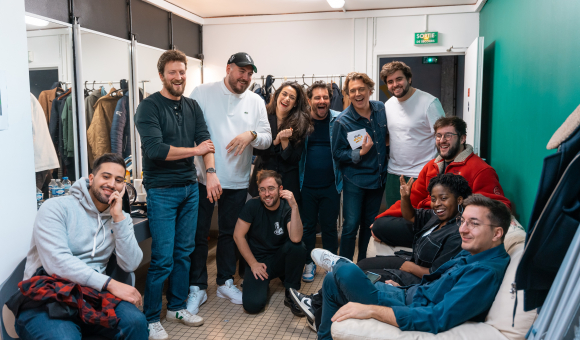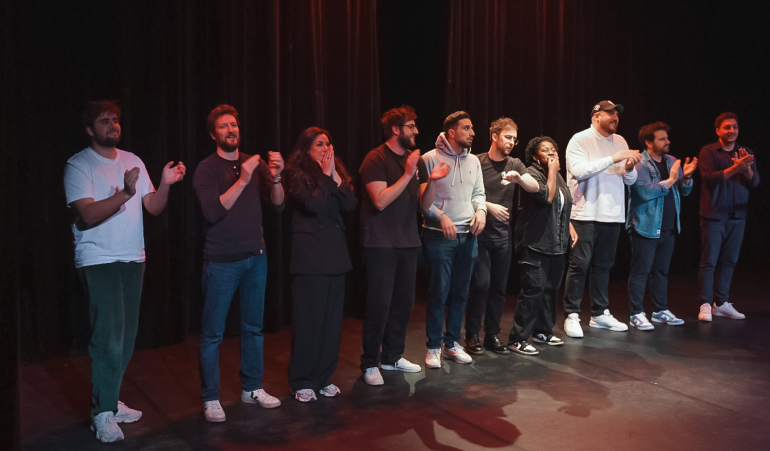
Could the art of making people laugh be our best ambassador abroad? The Wallonia-Brussels Federation (WBF) and Wallonia-Brussels International(WBI) joined forces with the Fédération Belge des Professionnels de l'Humour (Belgian Federation of Humour Professionals, FBPH) to offer talented youngsters the chance to perform in Paris. A few months later, the organisers set course for Kinshasa and repeated the operation there. We take a look back at two formidable human adventures that forged links and opened up horizons for the rising generation of Walloon and Brussels comedians.
July 2023 : At the outset, no fewer than 65 young professionals responded to a call for applications for emerging talent from the Wallonia-Brussels Federation to perform on Paris stages during the first Quinzaine de l'Humour. This was a great way for them to skip a few steps in their career path and step into the limelight in the French capital.
11 & 12 September 2023 : Based on an initial selection, some 20 young comedians were invited to perform in Brussels and Liège in front of a professional jury that included artist Virginie Hocq, Louis Heliot from the Wallonia-Brussels Centre in Paris and Yann Renoard, Managing Director of the Montreux Comedy Festival. A large audience of all ages came out to applaud these young up-and-coming comedians, both at the W:hall in Woluwe-Saint-Pierre and the Trocadero in Liège. Destination Paris : Mehdi BTB, Anthony Circus, Gaëtan Delferière, André Demarteau, Sacha Ferra, Julie Geller, Sarah Lélé, Lorenzo Mancini, Denis Richir and Kostia were the ten comedians selected by the jury.
28 November > 13 December 2023 : Opening night at the Wallonia-Brussels Centre in Paris for the official launch of the Paris Quinzaine de l'Humour. Alex Vizorek kicked off the gala evening in front of a packed house. The ten selected comedians took centre stage, performing in front of a host of celebrities and industry professionals. Next, five legendary Paris venues that were partners in the initiative welcomed the young Belgian comedians, who performed in pairs.
27 & 28 April 2024 : Following on from the success of the Paris event, Turbulences kinoises was launched at the Wallonia-Brussels Centre in Kinshasa, with a slightly different concept. Cécile Djunga, a Belgian artist of Congolese origin, was its initiator and director. There, Sarah Lélé, Mehdi BTB and Etienne Serck were invited to co-create a show with three of their Congolese counterparts, Florent Mangendo, Hervé Mukendi and Abelle Bowala, following a five-day joint residency that allowed them to explore the city and exchange views on their respective cultures and worlds. The programme also included a humour writing workshop, led by Etienne Serck and attended by some 20 participants.
The Wallonia-Brussels Federation: a land of humour
From the Taloche brothers to Bruno Coppens and Philippe Geluck. From Alex Vizorek to Guillermo Guiz, Virginie Hocq and others. In recent decades, successive generations of Belgian comedians have filled theatres both at home and abroad, creating a strong international reputation for Belgian humour. Interview with Vincent Counard, aka Taloche, artist, producer and president of the fledgling Belgian Federation of Humour Professionals (FBPH).
How would you sum up the first two Turbulences events, held successively in Paris and Kinshasa ?
It was a great success, both in Paris and in Kinshasa. Both professionals and the general public were well represented. It was a huge operation that required a lot of hard work and organisation. But the result exceeded our expectations and it was a fantastic experience. The few days I spent in Kinshasa convinced me that there is enormous value in these exchanges and in the encounters between Belgian and Congolese artists. As a next step, I'd like to bring them to Belgium for the next Liège Comedy Festival. From what I saw, their incredible performance on stage shows that there is a widespread desire to make people laugh. There's a lot of energy on the African continent.
Today, you give a great deal of time and energy to ensuring the profession is recognised in the Wallonia-Brussels Federation, and you are one of the founders of the FBPH. What role does this body play? And what challenges are you facing ?
It is still very much a baby (laughs), but the Federation already has 170 members, from established artists like Virginie Hocq to young up-and-coming performers. It is there to represent all forms of humour. We launched it in 2020, during Covid-19. Following performance cancellations, many artists called me, astonished at the lack of support for the sector. We quickly realised that there was nothing for comedians, although all other sectors were supported. We were simply not on the radar! We then began a battle to be recognised and heard. Today, we have a voice that counts when it comes to arts policy. The art of humour is taken seriously and the situation has evolved. We are therefore represented on the Chambre de Concertation des Arts vivants.
The Federation is there to structure and network the sector even further, as the Fédération des Arts forains or the Fédération du Conte does. It is also thanks to this dialogue with the subsidising authorities that the Belgian Turbulences operation was created. The initiative was launched with the support and at the request of WBF Minister-President Pierre-Yves Jeholet.
Today, the ideas are there, but we don't yet have enough human resources to run several projects simultaneously. For example, for Avignon, we are also going to look within our Federation to see if we can organise something together. Networking enables us to exchange ideas and make progress on international dissemination and promotion issues.
What is your take on the young, emerging comedy scene? How easy is it these days to make a name for yourself in this business ?
Today, the young French-speaking Belgian generation has a stand-up culture with its own codes. Their influence comes from the other side of the Atlantic, with inspiration from America and Quebec. Society is different, and there is also a great deal of openness to the world.
If we look at the new emerging scene, nine times out of ten, it's stand-up. Sometimes, we would like to introduce them to something else and build bridges with other artistic disciplines. It sometimes lacks carefreeness, especially in writing. The Federation organises workshops on movement and theatricality, for example, so that everyone can enrich their art. I'm convinced that it is important to build bridges between different artistic disciplines and awaken the curiosity of those who are starting out as comedians.
Is it easier to be recognised today ? Are there more dissemination channels ?
New venues dedicated to stand-up comedy are opening, attracting new audiences who discover culture through this medium. All this is very positive, of course. Everything has changed, with social networks and other means of communication making it possible to make a name for yourself quickly. It doesn't take long for someone to achieve huge success and fill large venues. But at the same time, the offer is crazy. There are ten times as many comedians today as there were ten years ago. TV and traditional media used to represent the Holy Grail, but that's no longer true for today's generation. There has obviously been a fairly significant evolution in the business. Comedy columns are also on the rise. However, I think it's more difficult to establish a long-term career.
Having worked in the industry for over 30 years, do you think there is such a thing as French-speaking Belgian humour ?
There are several possible answers. I'm sure mine won't be the same as those of other Federation members. Personally, I still have the impression that there's a specific nature to French-speaking Belgian humour that can't be defined. Belgian-style surrealism is often highlighted. If I can refer to a conversation I had a few years ago with Benoît Poelvoorde, he confided in me that this reference irritated him a little. For him, it means nothing. I think he had a point, but it doesn't mean much. However, there is still something indefinable that makes us different from the French or the Swiss, for example. There's a kind of self-mockery about artists. Belgians are not afraid to make fun of themselves. They don't take themselves very seriously. I think there's a form of distance that's truly Belgian and something to be proud of.
But today's young people don't always share this vision, and there's been a change in our humour. Their references are often elsewhere. For example, Guillermo Guiz is a role model for the up-and-coming generation of comedians, not because he's Belgian, but because he's talented and they like the way he sees things. But I see in him a true Belgianness, he is someone who doesn't take himself too seriously. In fact, he's a stand-up with a Belgian twist. Above all, I hope this spirit lasts for a long time to come.
To find out more... Two witnesses, two case studies
Sarah Lélé
A Belgian of Cameroonian origin, Sarah started doing stand-up early, in secondary school. Today, at the age of 21, she combines an artistic career with studies in Law and Political Science at the Université UCLouvain - Saint-Louis.
For me, humour is above all a wonderful means of expression. You can laugh at anything, but you have to do it in the right way. I'm interested in multiculturalism and fascinated by international relations.
Belgian Turbulences in Paris went really well, but in my opinion, the French capital is no longer essential, because the Belgian scene today is incredible and dynamic. But it's still very important to perform my scripts wherever I can, both here and abroad. I'm still learning a lot and I can see that sometimes you have to adapt and adopt different positions in front of certain audiences. In Paris, you have to arrive with confidence and go for it. (laughs)
Kinshasa was a unique experience. With our Congolese counterparts, we learned to see where our humour intersected and where it diverged. These exchanges also give led to friendship. I now know that I want to perform in Africa, because it's an audience I want to win over.
Mehdi BTB
Stand-up, commentator on Tarmac (RTBF) and BX1, but also financial consultant and business school graduate, Mehdi BTB juggles his multiple hats wonderfully. In 2020, he won the coveted King's Comedy Club "Next Prince of Comedy" title, previously awarded to Guillermo Guiz, Laura Laune and Fanny Ruwet.
Taking part in the Turbulences operation was a real opportunity. It enabled me to become even more professional and understand audiences that are different from those we know here in Brussels.
Kinshasa was a leap into the unknown, and we were really challenged. Congolese artists have quite an impressive technique. As I'm less familiar with the world of theatre, I discovered certain aspects of this discipline, such as directing. It was a great learning experience in terms of soft skills: adapting to the environment and writing new texts for the Kinshasa audience, who showed real curiosity. It was an intense and energy-intensive experience.
In Paris, we were on more familiar ground, but we also had to win over the audiences. Parisian audiences arrived with their arms folded, wondering what the young Belgian talents were going to produce. It was also professionally very interesting.
By Emmanuelle Dejaiffe
This article is from W+B Magazine No. 164.
